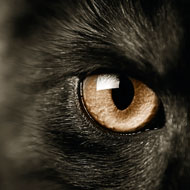
Single-pixel system prioritises most important areas
Scientists have developed a new camera system that is inspired by how animals process what they see.
Writing in the journal Science Advances, researchers at the University of Glasgow describe a new technique for creating video using single-pixel cameras.
The team discovered a way to instruct cameras to prioritise objects in images using a method that is similar to how brains make the same decisions.
In animals and humans, the eyes and brain work together to prioritise a specific field of view. When speaking to somebody else, for example, our eyes will focus on the speaker and our brains will dedicate less time to processing what is going on around them.
Using one light-sensitive pixel, the team’s system builds-up moving images of objects placed in front of it. Not only are single pixels cheaper than megapixels found in digital cameras, but they are also capable of building images at wavelengths where conventional cameras are expensive, or simply don’t exist.
The images the system puts out are square, with a total resolution of 1,000 pixels. In a conventional camera, those pixels would be spread evenly across the image. But this new system can choose to allocate its ‘pixel budget’ to prioritise the most important areas within the frame.
Scientists say that it places higher resolution pixels in these locations, sharpening the detail in some sections while sacrificing detail in others. This pixel distribution can be altered frame to frame - similar to how biological systems work, they add.
“Initially, the problem I was trying to solve was how to maximise the frame rate of the single-pixel system to make the video output as smooth as possible,” explained Dr David Phillips from the University of Glasgow’s School of Physics and Astronomy.
“However, I started to think a bit about how vision works in living things and I realised that building a programme which could interpret the data from our single-pixel sensor along similar lines could solve the problem. By channelling our pixel budget into areas where high resolutions were beneficial, such as where an object is moving, we could instruct the system to pay less attention to the other areas of the frame.
“By prioritising the information from the sensor in this way, we’ve managed to produce images at an improved frame rate but we’ve also taught the system a valuable new skill.”
Researchers now hope to improve the system and explore the opportunities for industrial and commercial use, for example in medical imaging.



 The Veterinary Medicines Directorate (VMD) is inviting applications from veterinary students to attend a one-week extramural studies (EMS) placement in July 2026.
The Veterinary Medicines Directorate (VMD) is inviting applications from veterinary students to attend a one-week extramural studies (EMS) placement in July 2026.